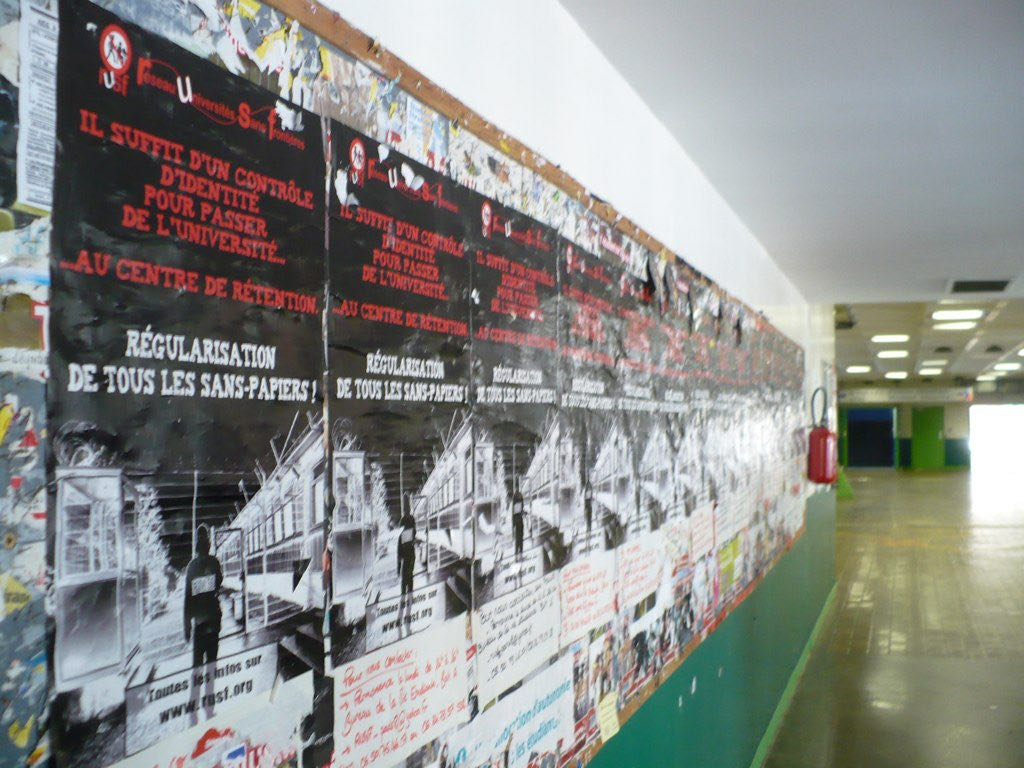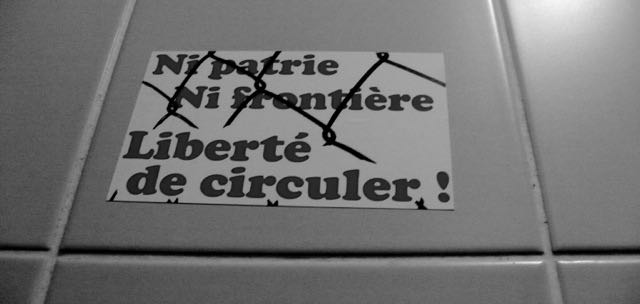Undocumented students (sans-papiers, students without papers) faced particular struggles to stay in France. It is worth dwelling on the way that these undocumented students were represented in local discourse, as that discourse said something about the limits of institutional recognition. The undocumented student was understood as suffering subjects in need of care (Ticktin 2011). Yet discourses around these students also had a certain ambiguity.

The statistics generally showed that foreign students, including ones from postcolonial societies, had higher class statuses than did French citizens from the nearby banlieue. Yet in the face of these statistics, the Department also enrolled a certain number of undocumented students.

This put the professors in an awkward situation, as we can see from a passage in Alain Brossat’s “Banlieue University” text.
What strikes me, with our undocumented students — there are always a few of them who manage to slip through the net — is the way in which, standing before us, they take all the shame and the fault upon themselves. They approach us — we, their teachers whom they hear speaking another language than that of the police and the State — as the guilty parties. They avoid having to talk to us about their “problem,” and when they do do it, it’s furtive and apologetic, and only when they can’t do otherwise. You can clearly feel that they can’t manage to persuade themselves that we could be on their side, against their persecutors — the academic administration and the security apparatus. After all, are we not also state functionaries, paid by the State, right by their side?[21]
(Brossat 2003)
Brossat had a certain lucidity about the ambiguities of being a state functionary. How could anyone not perceive the professors as representatives of the state institutions that paid their salaries? And yet at the same time, Brossat underestimated the extent of political support for the undocumented. There were many professors and students, in philosophy and elsewhere, who actively defended students in danger of deportation. Typical here would be a text forwarded to the departmental listserve in defense of a Haitian lycée student.
In France since 2009, Eden F. was still there when Haiti was ravaged by the earthquake. Holder of a Haitian secondary certificate, he successfully passed the tests to be able to continue his studies and to begin qualifications training. Now he is in the last year at the Mozart technical lycée, in Blanc-Mesnil. A well-known and serious student, this young man is nevertheless victim of an administrative decision by the Prefecture of Seine-Saint-Denis, inspired solely by accounting logics, to refuse him residence papers; they want to make him go back to Haiti.
The tropes here were those typical of the larger movement of support for undocumented immigrants in France. The framing is one of French left-statist politics: of the convergence of struggles, of the injustices and arbitrariness of the state apparatus in the face of Haitian catastrophe. Such cases came up frequently. When a recent graduate of the Paris 8 Anthropology Department was threatened with expulsion, several philosophy students joined the protests, and ultimately prevented his deportation. The department made no effort to pretend that it could right all wrongs; but the undocumented students, at least, were framed publicly as a virtuous cause.
Yet there were limits that the Department would not cross in its support of foreign students. It turns out that the Department, which generally had very open enrollment policies, did reject applications to study from certain students. I asked a university administrator how many rejected philosophy applications they had.
Administrator: Oh la la, not many.
Ethnographer: But when you do reject them, what for?
Administrator: Because the student has no philosophical background, has nothing to do with the philosophy discipline.
Ethnographer: Why sign up then?
Administrator: There are those who just want to enroll to enroll, to get their immigration papers [carte de séjour].
Ethnographer: Yeah. And it’s just a handful who do that?
Administrator: Uh, it’s not many.
One can certainly understand the rationale for not accepting students who had no actual interest in philosophy. But that policy did have a certain consequence. It showed that philosophy’s disciplinary borders may have been greatly pushed back, but that they were not thereby abolished. The administrative staff were thus required to filter out those who had no interest in philosophy except instrumentally, to get immigration papers. Whatever the motive, it is telling that even this Department could not accept everyone.
-
Ce qui me frappe, avec nos étudiants sans papiers – il y en a toujours quelques-uns qui parviennent à passer à travers les mailles du filet –, c’est la façon dont ils prennent, face à nous, toute la honte et la faute sur eux. Ils nous abordent, nous, leurs enseignants qu’ils entendent pourtant parler une autre langue que celle de la police et de l’Etat, en coupables. Ils évitent d’avoir à nous parler de leur « problème » et, quand ils le font, c’est furtivement, en s’excusant et quand ils ne peuvent faire autrement. On sent bien qu’ils ne parviennent pas à se persuader de ce que nous puissions, nous, être avec eux, contre leurs persécuteurs – l’administration universitaire et les préfectures. Après tout, ne sommes-nous pas, nous aussi, des fonctionnaires, payés par l’Etat, du côté du manche ? ↩